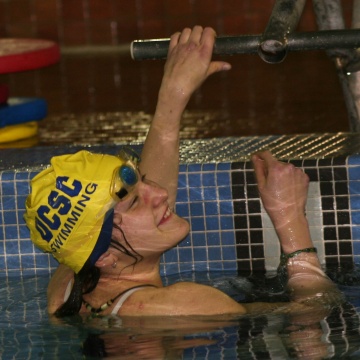
Just Add Water
As a 17-yr-old girl from Halifax, Nova Scotia, born with moderate quadriplegic cerebral palsy, being active has kept me mobile and on my feet, though I’m only able to walk about a block with great difficulty using a walker. I participate in a regular swim team, therapeutic horseback riding, and biking. Recently, I also sailed, downhill skied, and played sledge hockey. In the past, I’ve tried rock climbing, water skiing, canoeing, bowling, boccia, and wheelchair rugby, basketball, and volleyball.
Now, in 11th Grade French Immersion, I have focussed on just competitive swimming. I was the only disabled person on my swim team until recently. I love surprising people by walking with difficulty with my walker, getting in the water and swimming non-stop while people watch, their jaws dropping. Sometimes, after my races, spectators spontaneously burst into applause, even standing ovations. I am so touched and inspired by this, it makes me realize anything is possible with such support. Recently, I was chosen to compete in a para-swimming event in Montreal, as well as time trials for the 2013 Canada Games. I am classified as a S4 para-swimmer and there are only 8 para-swimmers in Canada more disabled than I am. Swimming has really enhanced my feeling of confidence and unstoppableness, and that hard work and persistence pay off.
Swimming gives me a sense of freedom through not needing anyone else in the water. Last summer, I swam over 1200m non-stop across a lake and back for almost two hours. Afterwards, a woman yelled at my mom, “Isn’t that a bit much??” Another time, a woman tried to “save” me using a noodle, despite my mom repeatedly assuring her I was fine. These incidents show prejudices and assumptions people still have about physical activity and disabilities.
I am more active than many of my able-bodied classmates, perhaps because I’ve done about 2 hours a day of special physical rehab (called Conductive Education) for my CP since I was 18 months old.
Physical activity is good for everyone but for people with a disability, it’s essential. People in my position who have stiff muscles would probably seize up like tin men if we didn’t stay active. We’d lose function and the freedom and independence we want. Being active gives my brain a break from homework. It’s good socially, meeting and spending time with others. It is fun and therapeutic at the same time. I still run into health care professionals who don’t see the point in me continuing to stay active and on my feet. But if you can walk or be active, you should. Use it or lose it! Save the wheelchair for when you’re short on time or have far to go, but too much time in it, and you’ll get too comfortable, lazy, weak, and overweight. I believe the orthopedic surgery I had almost 2 years ago was phenomenally successful partially because I kept up my fitness beforehand (“prehab”, my physiatrist calls it), and that my activity level has maintained the surgery’s benefits.
Physical activity has kept my wheelchair use to a minimum and made me strong in the belief that I can change my life and the lives of others. It has inspired me to enjoy life to the fullest. You never know your limits until you test them! With the right mindset, determination, and support, anything is possible.





